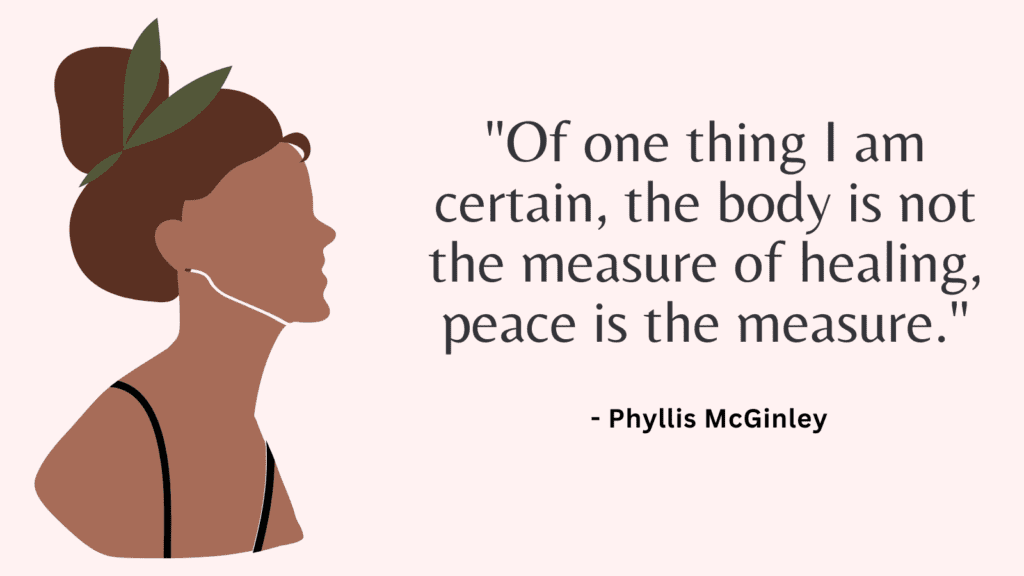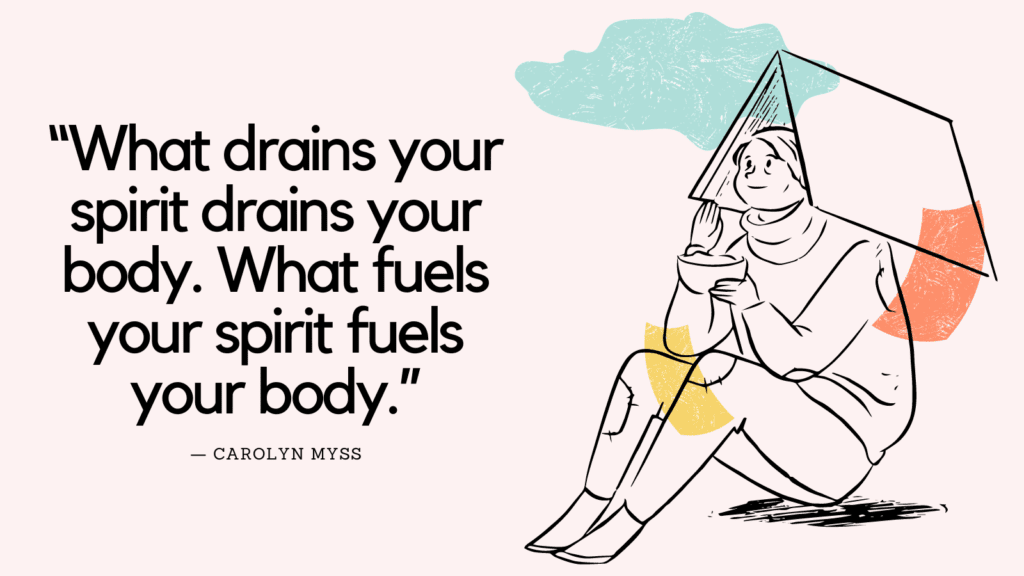This post contains some of the best body image journal prompts to promote self-acceptance.
What Is Journaling?
Journaling is expressing your thoughts and feelings without judgment from others or yourself.
It can be written on paper, or a digital gadget, or you can record yourself.
Journaling helps you observe your internal experience and process your feelings.
It can help relieve anxiety and stress and increase wellbeing as many studies show. (*)
Body Image Journal Prompts
1. How does your body image influence your life?
2. What aspects of your physical appearance do you really dislike?
3. Can you remember a time when a negative comment was made about your body? What was it? Who said it? How did you feel?
4. Do you focus more on what you dislike about your looks than on what you like?
5. Do you attach your self-worth to your looks?
6. How do societal standards affect your body image? Do you feel the pressure from society to look a certain way?
7. How has social media affected your body image?
Related: How To Break Emotional Eating? Top 8 Powerful Ways To Stop Comfort Eating
8. What is your current relationship with food like? Describe it.
9. What emotional reactions do you experience when you see your reflection in the mirror?
10. What negative thoughts do you experience frequently around your looks? What would you say to a friend who has the same thoughts?
11. Do you avoid certain activities or situations because you feel self-conscious? Specify them.
12. Do you spend a lot of time, effort or money attempting to “fix” your looks? If so, how did that affect your life? How could you have used those resources differently?
13. Do you often use clothes or cosmetics to cover up the “flaws” in your looks?
14. Do you spend a lot of time worrying about what others think of your appearance?
15. Do you spend a lot of time, effort, or money trying to “fix” your looks?
Related: 20 Eating Disorder Journal Prompts To Support Your Recovery
16. Do your feelings about your appearance get in the way of accepting yourself and enjoying your life?
17. How do you cope with feeling “ugly”?
18. How does your body support you? What does it allow you to do?
19. List 5 things you appreciate about your body.
20. What does your ideal relationship with your body look like to you?
21. How can you honor your body today?
Related: Positive Body Image Quiz (+Best 12 Tips On How To Improve Your Body Image)
22. How do you usually talk to yourself about your body?
23. Where did you first learn how your body “should” look?
24. What parts of your body do you criticize the most?
25. What do you fear people notice about your body?
26. How does your mood change the way you see your body?
26. What situations trigger body comparison for you?
27. How does social media affect how you feel about your body?
28. What beliefs about bodies feel hard to let go of?
29. How do you treat your body on days you dislike it?
30. What do you think your body says about you as a person?
31. When do you feel most uncomfortable in your body?
32. When do you feel most neutral about your body?
33. What comments about your body have stayed with you?
34. How do other people’s expectations affect your body image?
35. What does “looking good” mean to you, and who defined it?
36. How much of your self-worth is tied to appearance?
37. What do you assume others think about your body?
38. What proof do you actually have for those assumptions?
39. How does your body image affect your confidence?
40. How does it affect your relationships?
41. What clothes make you feel most like yourself?
42. What clothes make you feel the least comfortable, and why?
43. How do you feel about mirrors?
44. How do you feel about photos of yourself?
45. What body rules do you follow without questioning?
46. What would change if those rules didn’t exist?
47. How do you react when your body changes?
48. What emotions come up around weight, shape, or size?
49. How does stress show up in how you view your body?
50. How does rest affect how you see your body?
Body Image Worksheets
Benefits of Using Body Image Journal Prompts?
Using body image journal prompts can have numerous benefits, including:
1. Improved self-awareness: Journaling about body image can help you identify and reflect on your thoughts, feelings, and behaviors related to your body. This increased awareness can help you recognize when negative thoughts or behaviors arise so that you can take steps to address them.
2. Increased self-acceptance: By reflecting on your body image in a non-judgmental way, you can start to cultivate a greater sense of self-acceptance and self-compassion. This can help you feel more comfortable in your own skin and less focused on external validation.
3. Reduced anxiety and stress: Chronic negative body image can contribute to anxiety and stress. Journaling can help you process these feelings and reduce their intensity.
4. Improved relationships: When you feel more confident and accepting of yourself, you may find that your interpersonal relationships improve as well. You may be more comfortable expressing yourself and connecting with others.
5. Enhanced personal growth: Exploring your body image through journaling can be a powerful tool for personal growth and transformation. You may gain new insights into yourself and develop new coping strategies that can serve you well in many areas of your life.
How to Use Body Image Journal Prompts?
Here are some steps you can take to use body image journal prompts effectively:
1. Set aside time for journaling: Find a quiet, comfortable space where you can focus on your thoughts and feelings without distractions. Set aside at least 15-20 minutes for journaling.
2. Choose a prompt: You can find body image journal prompts online or come up with your own. Choose a prompt that resonates with you and that you feel comfortable exploring.
3. Start writing: Begin by writing the prompt at the top of your page and then write whatever comes to mind. Don’t worry about grammar or spelling – just let your thoughts flow freely. Write for as long as you need to feel like you’ve fully explored the prompt.
4. Reflect on what you’ve written: After journaling, take some time to reflect on what you wrote. What insights did you gain? What patterns or themes emerged? What actions can you take based on what you’ve learned?
5. Repeat regularly: Try to make journaling a regular practice – you might want to journal daily, weekly, or whenever you feel like you need to process your thoughts and feelings about your body image.
Remember that journaling is a personal process, and there’s no right or wrong way to do it.
Body Image Resources
Books
- More Than A Body By Lexie Kite, Lindsay Kite
- Wisdom of Your Body By Hillary L. PhD McBride
- The Body Image Workbook By Thomas Cash PhD
FREE Worksheets
- Body Image Worksheets Download PDF
- Body Shame Worksheets Download PDF
Quiz
TED Talk Body Image
- Enough with the fear of fat | Kelli Jean Drinkwater
- Body Positivity or Body Obsession? Learning to See More and Be More | Lindsay Kite
- Our bodies are not an image | Mary Jelkovsky
- Can Our Body Image Handle Social Media: Live Life Unfiltered | Keisha and Teagan Simpson
Conclusion
Using body image journal prompts can be a helpful way to explore your relationship with your body and work towards developing a more positive body image.
The most important thing is to be honest with yourself and use the prompts to explore your emotions and experiences in a non-judgmental way.



